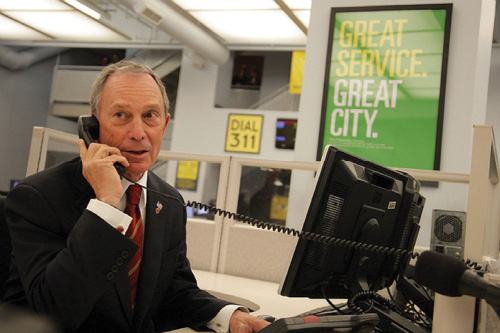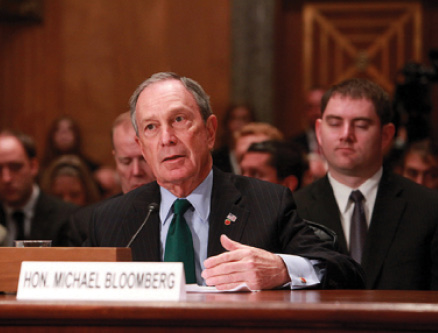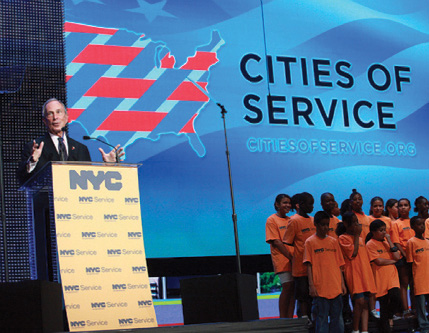Editors' Note
Michael Bloomberg began his career at Salomon Brothers, where he quickly advanced through the ranks, becoming a Partner in 1972. When he was fired in the wake of a Salomon merger in 1981, he used the money Salomon gave him when he left to start his own financial information company, Bloomberg L.P., which has since grown into a multinational media empire with more than 10,000 employees in more than 130 offices worldwide. Bloomberg was elected the 108th Mayor of New York in November 2001. He has a B.S. in engineering from Johns Hopkins University and an M.B.A. from Harvard.
You recently presented a Fiscal Year 2011 Executive Budget and an updated four-year financial plan for New York City. Would you highlight the four-year financial plan and your vision for what needs to be done to ensure long-term growth and fiscal stability for the city?
We’ve been focusing on jobs, investment, and creating/securing affordable neighborhoods.
In the short term, we are working on getting New Yorkers back to work – and it’s been effective. Our labor force has grown to its largest point since at least 1976, probably the largest point ever. It’s a sign that people from around the state, country, and world believe in New York City’s future and are coming here to pursue opportunities. And it’s a sign that our investments – to grow diverse sectors of our economy, expand job training and placement services, and improve New York City’s overall quality of life – are paying off. We know there are still far too many New Yorkers who are without jobs or struggling to make ends meet. But our city is moving in the right direction and will come through this downturn stronger than ever.

Mayor Bloomberg answering the ceremonial 100 millionth call at the 311 service center
We are also investing in new industries to create new jobs and diversify our economy. We recently made an announcement about NYC Media Lab, a laboratory that connects companies looking to advance new media technologies with local academic institutions undertaking related research. Another example is our SUNY Downstate Incubator, which will eventually offer space and business support to bioscience start-up companies.
And we continue to make our neighborhoods more affordable. New York City’s affordable housing program aims to build or preserve 165,000 units of housing – enough to house half a million New Yorkers. It is the largest and most ambitious such program in the nation, creating housing as well as jobs for New Yorkers.
You have achieved strong results in the area of public safety. To what do you attribute this success and do you feel the message is well understood worldwide on how secure New York City is?
After 9/11, the pundits said crime was going to go up. We proved them wrong. Mayor Giuliani had great success driving down crime and people believed it couldn’t be driven down any further. We proved them wrong.
We were successful because of smart new policing strategies like Operation Impact, data-driven resource allocation, new investments in technology (like the Real Time Crime Center), intense focus on illegal guns, and the hard work of the men and women of the NYPD, led by Commissioner Kelly.
The world knows New York City is safer than it’s ever been, and the proof is in the record number of tourists who flock here from all over the country and the world.

Mayor Bloomberg testifying before the U.S. Senate Committee on Homeland Security
and Governmental Affairs at a hearing on terrorists and guns
Education has been a key focus and priority for your administration. Are you happy with the progress that’s been made in addressing education challenges and what are your plans for further reform in the coming years?
Education is a top priority because quality public schools are essential to attracting and keeping middle class families here and to building a strong economy.
Our public school students are making incredible progress – test scores are up, more students are graduating from high school than ever before, and our schools are the safest they’ve been in years. But we still have a long way to go, and I’m determined to continue making strong and steady progress.
How important has the working relationship with the private sector and business leaders been to achieving many of your objectives, and are you satisfied with the way this relationship has evolved?
Since government simply cannot do it alone, public/private partnerships are instrumental to efficient and innovative governing, particularly in less fruitful economic times. Our administration has been extremely successful in forging strategic partnerships, which make new things possible both creatively and financially.
The Mayor’s Fund to Advance New York City is a great example of how we’ve made public/private partnerships work for New York. This nonprofit organization is committed to making a meaningful difference in the lives of New Yorkers with the help of engaged foundations, corporations, and individuals. The Mayor’s Fund invests private donations in programs that support innovation and emerging needs, while evaluating their effectiveness and feasibility of future funding.
Current projects supported by the Mayor’s Fund include the Family Justice Initiative, which serves adult victims of domestic violence and their children by providing a single delivery point for essential advocacy, case management, and legal and housing assistance; MillionTreesNYC, the city’s ambitious plan to plant and care for one million new trees throughout the five boroughs over the next decade; and initiatives of the Center for Economic Opportunity working to break the intergenerational cycle of poverty.

Mayor Bloomberg speaking at the opening ceremony of the National Conference
on Volunteering and Service
Are young people today entering public service, and is enough being done to attract top talent to join government?
Talented young people are attracted to public service for the same reason I was attracted to public service – there’s tremendous opportunity to make a difference.
In addition, NYC Service is an opportunity for every New Yorker to give back. An effort to make New York the easiest city in which to volunteer, NYC Service aims to drive volunteer resources to six areas where New York City’s needs are greatest: strengthening communities, helping neighbors in need, improving education, increasing public health, enhancing emergency preparedness, and protecting our environment.
There is much debate about the long-term leadership position of the United States in the global economy, especially relating to entrepreneurship and innovation. Is the United States losing its edge, and what needs to be done to help it retain its leadership position?
Thousands of jobs are being lost or relocated because of our nation’s broken immigration policies. New York City is the world capital of opportunity and entrepreneurism, and the strength of our economy hinges on making sure New York remains a place that welcomes new immigrants.
That’s our history, but it’s also our future, and that’s why I’ve strongly supported – and will continue to support – immigration reform that will allow more immigrants to come here. It’s why we continue to work with organizations like the New York Immigration Coalition, to make sure that our city’s immigrants have complete access to city services. And it’s why I joined with other big city mayors and business leaders to form Partnership for a New American Economy, a bipartisan effort to push Congress to take action.
Of course, the immigrants who come to New York are all seeking the same thing: opportunity.
How would some of the people closest to you describe your management style?
I’ve always thought you should hire creative, talented people and give them a long leash to be innovative while holding them accountable.
There has always been great interest about what is next for Michael Bloomberg. Do you see yourself continuing in public service or do you want to go back to the private sector?
Service has been part of my life since I was a kid in the Eagle Scouts. Years later, when I was starting out on Wall Street, a friend and I opened up a small after-school program uptown where kids could get help with their homework. We’d head up there in the evening, tutoring any kid who walked through the door. Once my company was up and running, I started a program to make it possible for each and every employee to volunteer in any way they chose, and this program continues to thrive at Bloomberg L.P.
I love my job as Mayor. And I will continue to be, as I always have been, committed to service.•


